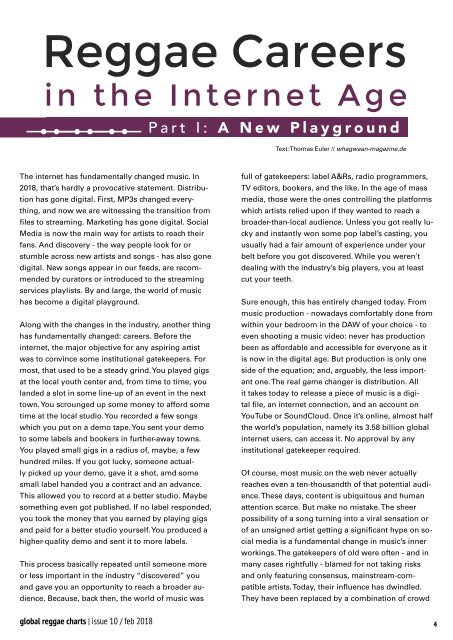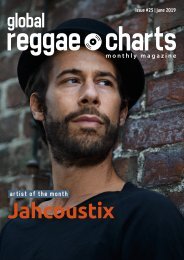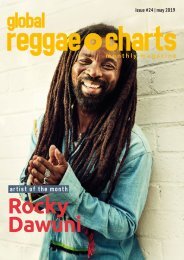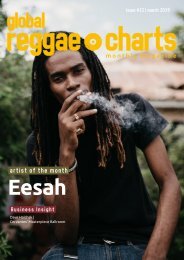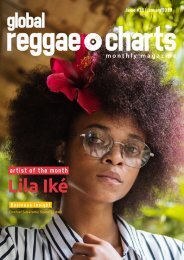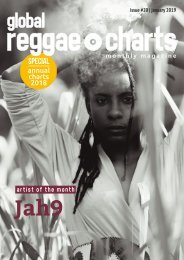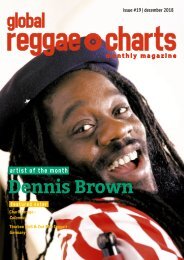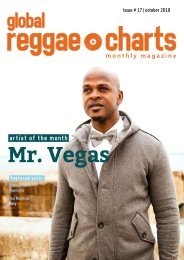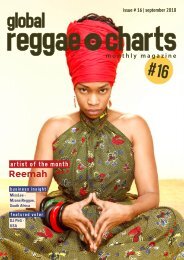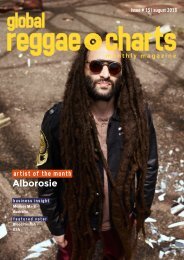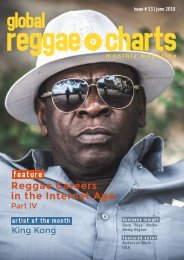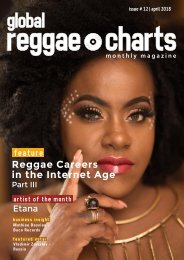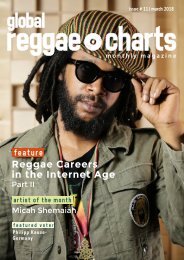Global Reggae Charts - Issue #10 / February 2018
Inside you can find the latest reggae album, single, and riddim charts based on votes by radio DJs and music directors from around the world.
Inside you can find the latest reggae album, single, and riddim charts based on votes by radio DJs and music directors from around the world.
You also want an ePaper? Increase the reach of your titles
YUMPU automatically turns print PDFs into web optimized ePapers that Google loves.
<strong>Reggae</strong> Careers<br />
in the Internet Age<br />
Part I: A New Playground<br />
Text: Thomas Euler // whagwaan-magazine.de<br />
The internet has fundamentally changed music. In<br />
<strong>2018</strong>, that’s hardly a provocative statement. Distribution<br />
has gone digital. First, MP3s changed everything,<br />
and now we are witnessing the transition from<br />
files to streaming. Marketing has gone digital. Social<br />
Media is now the main way for artists to reach their<br />
fans. And discovery - the way people look for or<br />
stumble across new artists and songs - has also gone<br />
digital. New songs appear in our feeds, are recommended<br />
by curators or introduced to the streaming<br />
services playlists. By and large, the world of music<br />
has become a digital playground.<br />
Along with the changes in the industry, another thing<br />
has fundamentally changed: careers. Before the<br />
internet, the major objective for any aspiring artist<br />
was to convince some institutional gatekeepers. For<br />
most, that used to be a steady grind. You played gigs<br />
at the local youth center and, from time to time, you<br />
landed a slot in some line-up of an event in the next<br />
town. You scrounged up some money to afford some<br />
time at the local studio. You recorded a few songs<br />
which you put on a demo tape. You sent your demo<br />
to some labels and bookers in further-away towns.<br />
You played small gigs in a radius of, maybe, a few<br />
hundred miles. If you got lucky, someone actually<br />
picked up your demo, gave it a shot, amd some<br />
small label handed you a contract and an advance.<br />
This allowed you to record at a better studio. Maybe<br />
something even got published. If no label responded,<br />
you took the money that you earned by playing gigs<br />
and paid for a better studio yourself. You produced a<br />
higher-quality demo and sent it to more labels.<br />
This process basically repeated until someone more<br />
or less important in the industry “discovered” you<br />
and gave you an opportunity to reach a broader audience.<br />
Because, back then, the world of music was<br />
full of gatekeepers: label A&Rs, radio programmers,<br />
TV editors, bookers, and the like. In the age of mass<br />
media, those were the ones controlling the platforms<br />
which artists relied upon if they wanted to reach a<br />
broader-than-local audience. Unless you got really lucky<br />
and instantly won some pop label’s casting, you<br />
usually had a fair amount of experience under your<br />
belt before you got discovered. While you weren’t<br />
dealing with the industry’s big players, you at least<br />
cut your teeth.<br />
Sure enough, this has entirely changed today. From<br />
music production - nowadays comfortably done from<br />
within your bedroom in the DAW of your choice - to<br />
even shooting a music video: never has production<br />
been as affordable and accessible for everyone as it<br />
is now in the digital age. But production is only one<br />
side of the equation; and, arguably, the less important<br />
one. The real game changer is distribution. All<br />
it takes today to release a piece of music is a digital<br />
file, an internet connection, and an account on<br />
YouTube or SoundCloud. Once it’s online, almost half<br />
the world’s population, namely its 3.58 billion global<br />
internet users, can access it. No approval by any<br />
institutional gatekeeper required.<br />
Of course, most music on the web never actually<br />
reaches even a ten-thousandth of that potential audience.<br />
These days, content is ubiquitous and human<br />
attention scarce. But make no mistake. The sheer<br />
possibility of a song turning into a viral sensation or<br />
of an unsigned artist getting a significant hype on social<br />
media is a fundamental change in music’s inner<br />
workings. The gatekeepers of old were often - and in<br />
many cases rightfully - blamed for not taking risks<br />
and only featuring consensus, mainstream-compatible<br />
artists. Today, their influence has dwindled.<br />
They have been replaced by a combination of crowd<br />
global reggae charts | issue 10 / feb <strong>2018</strong> 4


